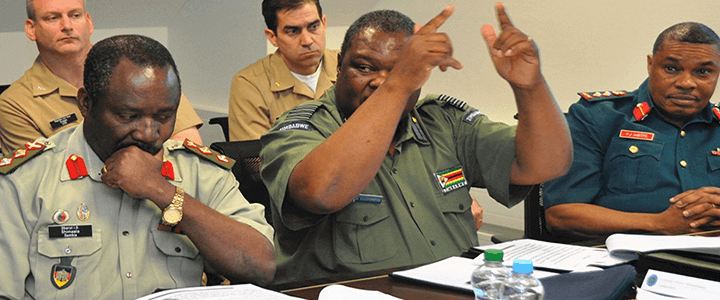Robert Mugabe, the Zimbabwean revolutionary hero who has ruled the southeastern African nation with an iron hand since it gained independence from the United Kingdom in 1980, is officially out as the head of the political party he helped found. After hours of deliberations Sunday, the secretary for legal affairs of the Zimbabwe African National Union-Patriotic Front party, Patrick Chinamasa, announced that Mugabe “hereby is recalled as first secretary and president of the ZANU-PF party.”
The ZANU-PF cleans house
Chinamasa then delivered the coup de grace: “He is therefore asked to resign forthwith.” The Zimbabwean parliament was to begin impeachment proceedings if Mugabe did not voluntarily resign the presidency by noon today. That deadline passed at 5:00 am EDT with no word from Mugabe, although he sounded defiant in a Sunday television experience. CNN has reported that a source tells them Mugabe will go quietly.
In a clean sweep, the party leaders moved to undo most of Mugabe’s recent personnel moves. They expelled the country’s one remaining vice president, Phelekezela Mphoko, from the party and reinstated vice president Emmerson “The Crocodile” Mnangagwa, who will be the ZANU-PF’s candidate for president in next year’s general election. Mugabe had removed Mnangagwa from office on November 6 in an attempt to position his wife Grace as his successor. The ZANU-PF also expelled Mrs. Mugabe on Sunday.
Mnangagwa’s firing and Grace Mugabe’s elevation together formed the last straw for Zimbabwe’s military leaders, who led a bloodless coup last Wednesday, placing President Mugabe under house arrest.
Reports that opposition leader Morgan Tsvangirai, the former prime minister who came close to defeating Mugabe at the polls in 2008, was returning to Harare to join a unity government turned out to be premature. While Tsvangirai did indeed return from exile in South Africa, he has not yet received an invitation to join the government. With Mnangagwa holding the reins, is doubtful that such an invitation is forthcoming.
The CROCODILE does not represent change
Anyone hoping that these events portend a shining democratic future for Zimbabwe should think again. They don’t call Mnangagwa The Crocodile for nothing. It should be no surprise that the military acted after Mugabe dismissed him.
Writing in The Zimbabwean newspaper this week, David Coltart, a Zimbabwean lawyer, Christian activist, and senator whose mother is descended from British settlers and whose father was a Scottish banker, said, “The real danger of the current situation is that having got their new preferred candidate into State House, the military will want to keep him or her there, no matter what the electorate wills.”
Mnangagwa, who was born in 1946 (or according to some sources, 1942) in what was then known as the Colony of Southern Rhodesia, is as steeped in the Zimbabwean revolution as is Mugabe. He spent time in prison for his role in a plot to blow up a train as a teenager, studying law while confined. He later received formal military training in the 1960s at the Egyptian Military Academy and at China’s School of Marxism.
He met Mugabe in Mozambique and in the 1970s rose to be a commander in the war for independence where he built his reputation. As one anonymous veteran told the BBC, “He’s a very cruel man, very cruel.”
Upon Mugabe’s assumption of power in 1980, Mnangagwa became the country’s first minister of state security, which placed him at the head of the country’s Central Intelligence Organization. During his tenure, the Zimbabwean Fifth Brigade, a military unit separate from the rest of the army and trained by North Korean soldiers, killed up to 10,000 civilians, primarily from the country’s Ndebele ethnic group. This episode, which would today be called ethnic cleansing, is remembered among the Ndebele with the Shona word Gukurahundi: “the early rain which washes away the chaff before the spring rains.”
Despite his power, or perhaps because of it, he remains a divisive and unpopular figure. Even with Zimbabwe’s history of sketchy elections, he lost his seat in parliament twice. In one of those losses, he is accused of firebombing his opponent’s house.
If the military does not interfere in next year’s elections, voters will likely show the ZANU-PF the door and usher in a new era for Zimbabwe. But as Coltart pointed out, that is a very big “if.”




